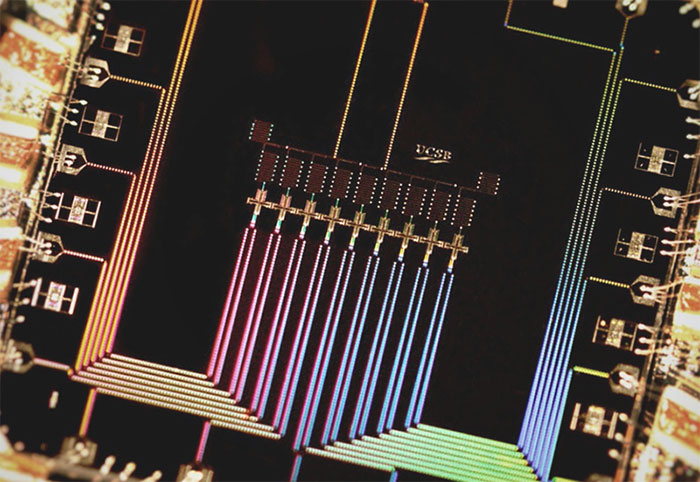Quantum Computer Accurately Simulates Hydrogen Molecule, Could Revolutionize Many Industries
Google, in collaboration with researchers from Harvard, Lawrence Berkeley National Labs, UC Santa Barbara, Tufts University and University College London, announced that they have achieved the first completely scalable quantum simulation of a molecule. Quantum-level chemistry simulation is one of the first real-world uses for quantum computers, and it could revolutionize medicine research, materials research, and much more.
Classical computers aren’t that good at simulating chemical reactions. For instance, accurately computing the energies of the propane molecule (C3H8) takes ten days with a classic computer design. Molecular systems use highly-entangled superposition states, which require exponentially more computing resources to represent them sufficiently with high precision.
If it takes up to ten days to represent a single molecule with high precision, then representing thousands (or millions) of molecules at the same time, and how they react with each other, becomes an almost impossible task with a classic computer architecture. It is also a highly inefficient process in terms of energy use. Chemical reactions seem to work at a quantum level, so quantum computers are ideal for trying to simulate them as efficiently and as accurately as possible.
Google has been researching quantum computers for many years, primarily since it started collaborating with D-Wave, a Canadian company. D-Wave doesn’t have a universal quantum computer, but its quantum-annealing computer specializes in solving optimization problems. Google has also been working on building a much more useful (but still currently limited) universal quantum computer with a few stable qubits, which the company seems to have used for this experiment.
Google was able to compute the energy landscape of the hydrogen H2 molecule using a quantum computer. To prove that it worked, the team behind the experiment compared the results with the results obtained from a classically computed simulation. They lined up almost perfectly.
Simulating much larger scale chemical systems would be impossible on traditional computers, but quantum computers may provide the solution to that problem. For instance, Google believes that when universal quantum computers achieve about one hundred qubits, it should be possible to simulate how bacteria produce fertilizer at room temperature.
Producing fertilizer requires 1 to 2 percent of the global energy production, according to Google, which means we haven’t discovered how to make it efficiently yet. Quantum computers may provide us these answers. Once quantum computers have enough qubits they could also aid in discovering more efficient solar panel cells, better batteries, materials, medicine, and so on.
Get Tom's Hardware's best news and in-depth reviews, straight to your inbox.
Lucian Armasu is a Contributing Writer for Tom's Hardware US. He covers software news and the issues surrounding privacy and security.
-
targetdrone "Classical computers aren’t that good at simulating chemical reactions. For instance, accurately computing the energies of the propane molecule (C3H8) takes ten days with a classic computer design."Reply
Some actual computing specs would be nice to get some perspective.
-
itsnotmeitsyou Research computer simulation is often done on cluster-supercomputers. Assuming that the best anyone can get is 10days, I'm sure they weren't trying this on some i7/Xeon desktop. It was probably run on a cluster of 100-1000 processors in a university high-performance computing lab.Reply -
Slatteew One thing i'm curious about is how quantum computing can overcome Chaos. Chaos in the context of Chaos Theory and the difficulty of modeling complex systems. On computers today, precision in the amount of digits makes calculation and modeling of many complex systems impossible because approximately the same starting points will produce radically different outcomes based on small discrepancies in the calculation and round off. From what I understand of quantum computing and this article, it may be able to have the precision, power, and much lower time necessary to effectively negate Chaos? Color me skeptical........maybe in some systems it'll work, but most complex systems will stump it and will exhibit Chaos.Reply -
desolation0 SLATTEEW - The intermediary variables in quantum computing are held in the properties of the quantum system. That system is not limited to digital precision. Assuming the program is within the scope of being solvable by that system in one pass, there is no need for intermediate rounding errors that come up in classical computing from the need to store the variables between process clocks. Only when we finally set a classical computer to interpret the results for us is that rounding error finally introduced again. This doesn't remove all potential for chaos, but does reduce one of the causes for it.Reply -
Slatteew DESOLATION0 - Thank you for your response. Very informative. I'm not up to snuff on all things Quantum Computing so idk about some of the things you talked about. But that's good to know and I'd also agree it would reduce some, if not at least 1 of the causes of Chaos in our calculations and simulations. :)Reply -
photonboy Chaos isn't an issue if you choose your problems appropriately. There are many types of problems that are unsuitable to a quantum computer.Reply
I still don't understand how the lack of memory is going to be resolved for anything more than very simple problems. -
hoofhearted Good reads for QCL (Quantum Computing Language) (Shor and Grover):Reply
http://tph.tuwien.ac.at/~oemer/doc/quprog/node17.html
http://tph.tuwien.ac.at/~oemer/doc/quprog/node18.html -
rush21hit Pardon my dumb question, but why is it GPGPU or GPU computing deemed inadequate for such task?Reply -
PoweredByLight QM is just math, not reality. It fails on many levels such as ionization energies (QM software relies on data sets calculated from trials over many years- not closed-form solutions). A classical computer running Millsian software can already calculate in real-time molecules as complex as insulin, including all binding energies. Whatever anyone thinks of the developers theoretical ideas, the software just works.Reply
